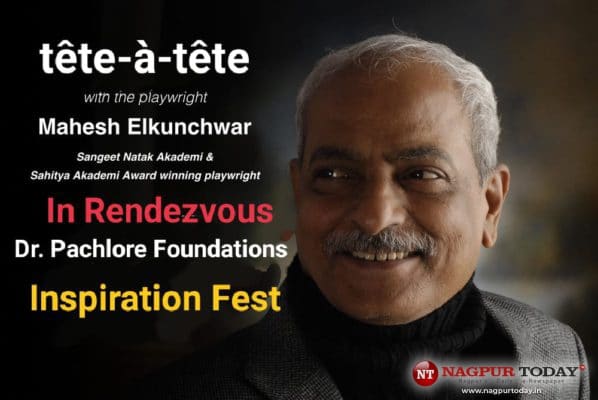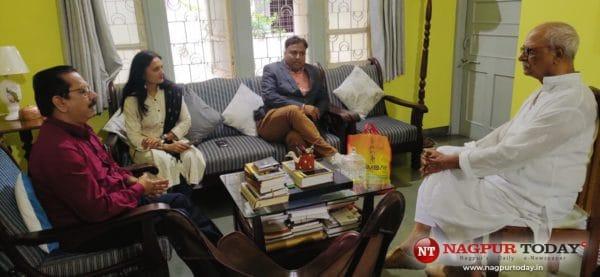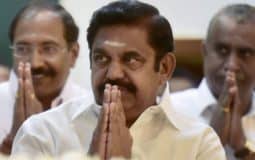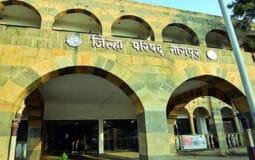Nagpur: Dr. Vikramsingh Pachlore, Chancellor – Maestro Multiversity, India, had rendezvous with theatre tycoon Mahesh Elkunchwar. Nagpur Today is giving an insight into the meeting in Dr Pachlore’s own words. He says:
On very bright noon of Inspiration Day the monsoon clouds gave the radiance of Sunshine with joy and enthusiasm to meet and felicitate ,Eminent Playwright and Literature scholar Mahesh Elkunchwar was running high in our spirit. At the moment we reached his Vintage Villa, he welcomed us with his mystic smile, perhaps his magnetic bliss to be specific. Like a Greek god he was standing stalwart at the age of 83. The affection and warmth, he showered on us was nothing less than bestowed blessings of benevolent Guide , Guardian , Godfather and Guru.
We talked , chatted and discussed on various casual , usual and unusual issues from literature to cinema from politics to agriculture from youth to grey we tried our best to extract the nectar of his wisdom and intellectual generosity. Simplicity is his signature, in his humble abode; well crafted and decorated with aesthetic sensibility, he gave the message proving that’ it’s very simple to be happy but it’s very difficult to be simple.’
The Tea Time Talk of our Tete-e-Tete turned into remarkable rendezvous with the Theatre Tycoon. He appreciated all the Vision and Mission activities of Dr. Pachore Foundation and extended his wishes & blessings. Above all, the delicacy of sweet Shrikhand served to the kids, who relished it with sheer pleasure .
Mahesh ElKunchwar has transcended himself into Phenomenon. His work reflects his wisdom and speaks volumes about his virtue. His contribution is Titanic and a great treasure to mankind not only to the literary world but to the entire society. It was a dream come true, perhaps the gratitude gift by Almighty that the compassionate meet with Mahesh Elkunchwar has enriched our heart and soul with abundance , Peace and Serenity. While bidding farewell, we wished for his health, happiness and harmony and prayed to meet again with same vigour vitality and above all his contigious enthusiasm. Inspiration day got really inspired with the real icon and Idol of intellect.
We revisit the legacy of Mahesh Elkunchwar, the patriarch of a great tradition of Marathi theatre on occasion of being proud recipient of, International ‘Pride Of Planet’ 2022 Award given by Dr. Pachlore Foundations on Inspiration Day. Mahesh Elkunchwar is one of the most influential playwrights in Indian theatre today. His plays in Marathi have been translated and performed in multiple Indian languages as well as in English, French and German. Among the numerous awards to his name are the Sahitya Akademi Award for Marathi in 2002 and the Sangeet Naatak Akademi, Ratna Sadasya, which was conferred upon him in 2013. Many of his plays have been made into films — Holi was directed by Ketan Mehta, Party by Govind Nihalani and Sonata by Aparna Sen.
One evening almost 50 years ago, when he was a college student, Mahesh Elkunchwar wanted to see a film. The tickets were sold out, so he went to see a play instead. It was called Mi Jinklo, Mi Harlo (IWon, I Lost), written by Vijay Tendulkar and directed by Vijaya Mehta. The performance, the language, and the recreation of reality had a magical impact on him, transforming his life.
The next evening he went to see the play again, and after that, began to read every play he could find. He decided to write plays. Two years later, the Marathi literary magazine Satyakatha published his first play, Sultan. Mehta, whose production had such an imprint on Elkunchwar’s mind, noticed the latter’s play, and decided to stage his work, beginning a fruitful partnership that has lasted decades. She would also stage Holi, which Ketan Mehta would later film.
Elkunchwar , the patriarch of a great tradition of Marathi theatre, of socially relevant plays written with a sense of urgency and without the polemic that would make the relevance seem didactic, and with seething rage over middle-class ennui in grappling with its own hypocrisies. He has been a recipient of the Homi Bhabha Fellowship and Brittingham Fellowship, and has received honours from the Sangeet Natak Akademi and Sahitya Akademi, as well as the Saraswati Samman and Janasthan Puraskar; sometimes he has donated his prize money quietly to non-government organizations working with vulnerable groups of society. Rajhans Prakashan published Saptak, a collection of his lectures.
Within the Marathi world, the late Tendulkar, who was Elkunchwar’s contemporary, cast a long shadow. But Elkunchwar’s often surreal plots and pithy social commentary had its own knowledgeable and serious following, which enriched Marathi, and indeed Indian, theatre. The noted Marathi critic and writer, Shanta Gokhale, wrote : “Elkunchwar’s contribution is second only to Tendulkar’s. Tendulkar wrote many more plays but Elkunchwar played with form and language much more than him. In that sense, he has been a consistent experimenter.” She points out one of his latest plays, Eka Natacha Mrityu (Death of an Actor), which departs completely from the conventions of the well-made play and plunges into a form that uses surrealistic imagery and masks.
Over the years, Elkunchwar has travelled a long distance from being seen as an angry young man of theatre. That, in any case, is a lazy, borrowed description of a man whose anger was restrained, unlike John Osborne’s in Look Back In Anger, which had made the phrase popular. For Elkunchwar’s text simmers– its sharp, steel-like resolve slices through conventions. Elkunchwar’s silences are more meaningful, as in the writing of Harold Pinter.
Gyanpith Award-winning Kannada playwright Girish Karnad expressed : “What sets Mahesh apart among Indian playwrights is his command of the broken phrase, the sentence half-uttered, the casual pause — in his hands these silences can be lethal and communicate a menace that would be scattered in a collection of fully expressive sentences. Every time I have taken on a text of his (like Sonata, which I have just finished putting into Kannada), I have enjoyed the crispness of sentences often left cliff-hanging, the deliberate avoidance of a direct reply, and the poignancy created by any direct verbal contact. His plays are resonant with the dhwani (sound) of the words he has chosen to use or throw away.”
In an open rendezvous with Maestro Dr. Vikramsingh Pachlore & Dr. Ashok Rana on Inspiration Day, Elkunchwar said: “When I intend a pause in a dialogue, every pause has its duration and every actor should know this. In my first play I used to refer to counts. But then I realized that the director never follows this and I gave it up. Yet I mark the pauses so that the readers should know. Pause can give a complexity to dialogues and actors should use them more than words to reach out to the audience.”
Of all his plays, the one that resonates the most, and the one with which he is associated most, is Wada Chirebandi, which Vijaya Mehta would direct, and which has been staged in several Indian languages since. Karnad has translated four of his plays, but his regret is that Wada Chirebandi had already been translated when he came to Elkunchwar’s work. Elkunchwar wrote two sequels to Wada Chirebandi — Magna Talyakathi and Yuganta.
Karnad considers that play a modern classic of Indian theatre. He writes in a note: “What is a classic? How do we recognize one?…The ultimate test is that a classic declares itself instantly. You see the play and you know you have seen something that ‘has broken open new grounds’, ‘will stand the test of time’, ‘ranks with the best’ or whatever your test is. By and large, Indian plays with contemporary themes are largely influenced by Ibsen, which deal with social problems or paint family melodramas with some secret guilt tucked away waiting for a last-minute release. Wada deals with a whole age; showing gently if firmly the slow decline in the fortunes of a traditional Hindu family, as it comes to terms with the demands of modernity. The pain is muted and therefore searing.” Indeed, for many critics, dramatists, and fans of his work, that play remains his seminal work.
Elkunchwar wrote the play after a dry period during which he had not written anything that he thought was good enough. He was becoming an introvert; Wada helped him grow up. Elkunchwar was born in an old house, like the wada in the play. His father was a landlord, but his brothers and he left the house to seek a different life. The wadas nearby were all crumbling. There was a sense of inevitability, lethargy, and resistance to change.
In the interview, he recounts a story he discussed with Satyadev Dubey, about a friend of Dubey’s who had bought a tractor he neither used nor sold, letting it decay. Elkunchwar used that image in the play, as a metaphor for acquiring a tool and being unable and unwilling to use it. Wada presented the decline not only of a family, but of a particular time, of a way of life: the family cook, who is the third generation of cooks working for the Deshpandes, leaves the house to work at a restaurant at a bus stand; other brothers acknowledge that other families have turned their homes into shops, set up businesses, even built brothels. “We cannot do this,” one brother tells another. And he has used surreal motifs to suggest where reality ends and fantasy begins. “I was writing about the consistency of the human mind in this play. Be it very sorrowful, but it keeps flowing like a river and we keep finding some meaning in it,” he said in the interview.
In capturing the lives of the Deshpande family, once proud landed gentry, and now seeing hard times, caught between nostalgia for a past that won’t recur and the financial hardship of the present, Elkunchwar has created an epic of our times. Wada Chirebandi has been called an epic of ordinary people– one told by an extraordinary man.
One of his more accessible plays is Party, which concerned itself with the question of art versus action while observing the irony and hypocrisy of patrons of art. Elkunchwar satirized the artificial and suffocating veneer of sophistication.
Like Mohan Rakesh in Hindi and Badal Sircar in Bengali, Elkunchwar has transcended the limits imposed on him by the confines and milieu of his language and geography. The rich tradition of translations and interpretations within Indian languages made his plays go further.
Elkunchwar’s plays are contemporary, with urban settings. Maestro Dr. Vikramsingh Pachlore emphasizes that Elkunchwar is important for various reasons but primarily because “…he captures a society in transition. Like Chekhov, he too is fascinated by rural/feudal values and urban aspirations.”
His influence on Marathi theatre is lasting. Dr. Ashok Rana adds: “He is in the position of a guru. It is not only his work that has given him this position but, as importantly, the fact that he has always made himself accessible to them and has revelled in their company.”
Dr Sanjivani Pachlore ( Medical Director,DPF-PVMM) ,expressed her gratitude for making Inspiration Fest -An Intellectual treat with blessings of Mahesh Elkunchwar. She expressed her concern to preserve and treasure the theatrical talent of Elkunchwar’s elegance for upcoming generations and literature scholars.


















